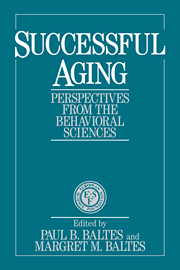Book contents
- Frontmatter
- Contents
- List of contributors
- Foreword
- Preface
- 1 Psychological perspectives on successful aging: The model of selective optimization with compensation
- 2 Medical perspectives upon successful aging
- 3 Successful aging in a post-retired society
- 4 The optimization of cognitive functioning in old age: Predictions based on cohort-sequential and longitudinal data
- 5 The optimization of episodic remembering in old age
- 6 Peak performance and age: An examination of peak performance in sports
- 7 Personal control over development and quality of life perspectives in adulthood
- 8 Successful mastery of bereavement and widowhood: A life-course perspective
- 9 The Bonn Longitudinal Study of Aging: Coping, life adjustment, and life satisfaction
- 10 Risk and protective factors in the transition to young adulthood
- 11 Avoiding negative life outcomes: Evidence from a forty-five year study
- 12 Developmental behavioral genetics and successful aging
- Name index
- Subject index
3 - Successful aging in a post-retired society
Published online by Cambridge University Press: 22 March 2010
- Frontmatter
- Contents
- List of contributors
- Foreword
- Preface
- 1 Psychological perspectives on successful aging: The model of selective optimization with compensation
- 2 Medical perspectives upon successful aging
- 3 Successful aging in a post-retired society
- 4 The optimization of cognitive functioning in old age: Predictions based on cohort-sequential and longitudinal data
- 5 The optimization of episodic remembering in old age
- 6 Peak performance and age: An examination of peak performance in sports
- 7 Personal control over development and quality of life perspectives in adulthood
- 8 Successful mastery of bereavement and widowhood: A life-course perspective
- 9 The Bonn Longitudinal Study of Aging: Coping, life adjustment, and life satisfaction
- 10 Risk and protective factors in the transition to young adulthood
- 11 Avoiding negative life outcomes: Evidence from a forty-five year study
- 12 Developmental behavioral genetics and successful aging
- Name index
- Subject index
Summary
Successful aging: A transactional view from the social sciences
Viewed from the perspective of the social sciences, successful aging is a quality of the transaction between the changing person and changing society over the entire life span but especially during a person's later years. As a sociological construct, successful aging is not an attribute of the person. Strictly speaking, it is neither an individual-difference variable such as cognitive wisdom nor the relative prevalence of vitality over morbidity in the later years of life. These orientations are wholly legitimate intellectually. They offer highly valuable insights, from the point of view of the person as a psychological or biological entity, within a given environment. Although both constructs may reflect influences from the social and physical ecology of the person, wisdom and vitality tend to be studied as person-centered states or trait variables and in terms of the determinants of individual differences in them, including variations by sociocultural and demographic categories. However, the static or dynamic nature of the embedding sociocultural system typically is not an explicit part of the definition of what constitutes successful aging in these formulations. That is, the nature of society and its dynamic properties are cast as influences on successful aging and not as part of its very essential manifestation and definition.
By contrast, the sociological orientation to successful aging can take at least two forms. The first begins from the perspective of the social collectivity, rather than the person, and asks how the aging of a person or persons might lead, optimally, toward the betterment of society, that is, toward improving the quality of life for the population in general or perpetuating the social system beyond the lifetime of the oldest cohorts.
- Type
- Chapter
- Information
- Successful AgingPerspectives from the Behavioral Sciences, pp. 50 - 93Publisher: Cambridge University PressPrint publication year: 1990
- 29
- Cited by

